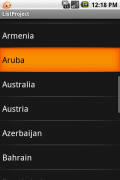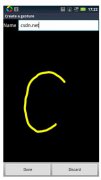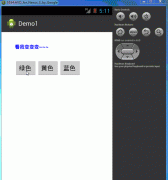Android提高之SQLite分页表格实现方法
继前一篇文章讲到Android上的SQLite分页读取,其功能只是用文本框显示数据而已。本文就讲得更加深入些,实现并封装一个SQL分页表格控件,不仅支持分页还是以表格的形式展示数据。
先来看看本文程序运行的动画如下图所示:

这个SQL分页表格控件主要分为“表格区”和“分页栏”这两部分,这两部分都是基于GridView实现的。网上介绍Android上实现表格的DEMO一般都用ListView。ListView与GridView对比,ListView最大的优势是格单元的大小可以自定义,可以某单元长某单元短,但是难于实现自适应数据表的结构;而GridView最大的优势就是自适应数据表的结构,但是格单元统一大小。对于数据表结构多变的情况,建议使用GridView实现表格。
本文实现的SQL分页表格控件有以下特点:
1.自适应数据表结构,但是格单元统一大小;
2.支持分页;
3.“表格区”有按键事件回调处理,“分页栏”有分页切换事件回调处理。
本文程序代码较多,可以到这里下载整个工程的源码:http://xiazai.jb51.net/201408/yuanma/testSQLite(jb51.bet).rar
items.xml的代码如下,它是“表格区”和“分页栏”的格单元实现:
<?xml version="1.0" encoding="utf-8"?> <LinearLayout android:id="@+id/LinearLayout01" xmlns:android="http://schemas.android.com/apk/res/android" android:layout_width="fill_parent" android:background="#555555" android:layout_height="wrap_content"> <TextView android:layout_below="@+id/ItemImage" android:text="TextView01" android:id="@+id/ItemText" android:bufferType="normal" android:singleLine="true" android:background="#000000" android:layout_width="fill_parent" android:gravity="center" android:layout_margin="1dip" android:layout_gravity="center" android:layout_height="wrap_content"> </TextView> </LinearLayout>
main.xml的代码如下:
<?xml version="1.0" encoding="utf-8"?> <LinearLayout xmlns:android="http://schemas.android.com/apk/res/android" android:orientation="vertical" android:layout_width="fill_parent" android:layout_height="fill_parent" android:id="@+id/MainLinearLayout"> <Button android:layout_height="wrap_content" android:layout_width="fill_parent" android:id="@+id/btnCreateDB" android:text="创建数据库"></Button> <Button android:layout_height="wrap_content" android:layout_width="fill_parent" android:text="插入一串实验数据" android:id="@+id/btnInsertRec"></Button> <Button android:layout_height="wrap_content" android:id="@+id/btnClose" android:text="关闭数据库" android:layout_width="fill_parent"></Button> </LinearLayout>
演示程序testSQLite.java的源码如下:
package com.testSQLite;
import android.app.Activity;
import android.database.Cursor;
import android.database.SQLException;
import android.database.sqlite.SQLiteDatabase;
import android.os.Bundle;
import android.util.Log;
import android.view.View;
import android.widget.Button;
import android.widget.LinearLayout;
import android.widget.Toast;
public class testSQLite extends Activity {
GVTable table;
Button btnCreateDB, btnInsert, btnClose;
SQLiteDatabase db;
int id;//添加记录时的id累加标记,必须全局
private static final String TABLE_NAME = "stu";
private static final String ID = "id";
private static final String NAME = "name";
private static final String PHONE = "phone";
private static final String ADDRESS = "address";
private static final String AGE = "age";
@Override
public void onCreate(Bundle savedInstanceState) {
super.onCreate(savedInstanceState);
setContentView(R.layout.main);
btnCreateDB = (Button) this.findViewById(R.id.btnCreateDB);
btnCreateDB.setOnClickListener(new ClickEvent());
btnInsert = (Button) this.findViewById(R.id.btnInsertRec);
btnInsert.setOnClickListener(new ClickEvent());
btnClose = (Button) this.findViewById(R.id.btnClose);
btnClose.setOnClickListener(new ClickEvent());
table=new GVTable(this);
table.gvSetTableRowCount(8);//设置每个分页的ROW总数
LinearLayout ly = (LinearLayout) findViewById(R.id.MainLinearLayout);
table.setTableOnClickListener(new GVTable.OnTableClickListener() {
@Override
public void onTableClickListener(int x,int y,Cursor c) {
c.moveToPosition(y);
String str=c.getString(x)+" 位置:("+String.valueOf(x)+","+String.valueOf(y)+")";
Toast.makeText(testSQLite.this, str, 1000).show();
}
});
table.setOnPageSwitchListener(new GVTable.OnPageSwitchListener() {
@Override
public void onPageSwitchListener(int pageID,int pageCount) {
String str="共有"+String.valueOf(pageCount)+
" 当前第"+String.valueOf(pageID)+"页";
Toast.makeText(testSQLite.this, str, 1000).show();
}
});
ly.addView(table);
}
class ClickEvent implements View.OnClickListener {
@Override
public void onClick(View v) {
if (v == btnCreateDB) {
CreateDB();
} else if (v == btnInsert) {
InsertRecord(16);//插入16条记录
table.gvUpdatePageBar("select count(*) from " + TABLE_NAME,db);
table.gvReadyTable("select * from " + TABLE_NAME,db);
}else if (v == btnClose) {
table.gvRemoveAll();
db.close();
}
}
}
/**
* 在内存创建数据库和数据表
*/
void CreateDB() {
// 在内存创建数据库
db = SQLiteDatabase.create(null);
Log.e("DB Path", db.getPath());
String amount = String.valueOf(databaseList().length);
Log.e("DB amount", amount);
// 创建数据表
String sql = "CREATE TABLE " + TABLE_NAME + " (" +
ID + " text not null, " + NAME + " text not null," +
ADDRESS + " text not null, " + PHONE + " text not null," +
AGE + " text not null "+");";
try {
db.execSQL("DROP TABLE IF EXISTS " + TABLE_NAME);
db.execSQL(sql);
} catch (SQLException e) {}
}
/**
* 插入N条数据
*/
void InsertRecord(int n) {
int total = id + n;
for (; id < total; id++) {
String sql = "insert into " + TABLE_NAME + " (" +
ID + ", " + NAME+", " + ADDRESS+", " + PHONE+", "+AGE
+ ") values('" + String.valueOf(id) + "', 'man','address','123456789','18');";
try {
db.execSQL(sql);
} catch (SQLException e) {
}
}
}
}





